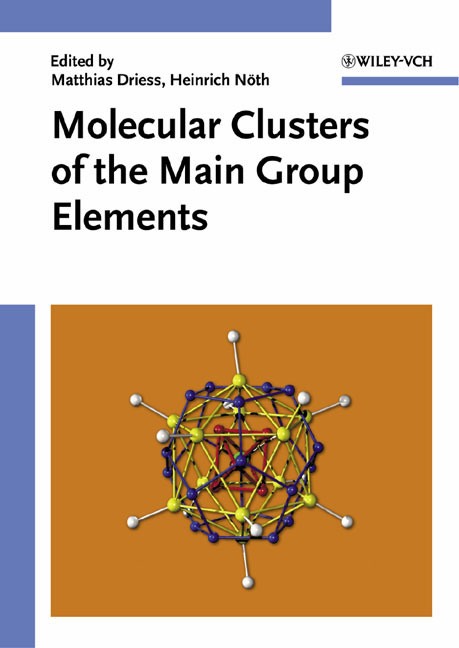
Molecular Clusters of the Main Group Elements
Wiley-VCH (Verlag)
978-3-527-30654-1 (ISBN)
- Titel ist leider vergriffen;
keine Neuauflage - Artikel merken
It treats both homonuclear and heteronuclear clusters, including:
the theory and concepts in main-group cluster chemistry,
* novel boranes and heteroboranes,
* silicon/germanium/tin clusters,
* alkali metal suboxides,
* clusters in alloys with mercury,
* chalkogen clusters
* and numerous other compound classes.
The whole is illustrated by examples of the great potential for technical applications such as
electron storage, cancer therapy and in optoelectronic devices.
Its systematic coverage of all relevant main group elements makes this the prime reference source in the field.
Matthias Driess was born in 1961 in Eisenach, Thuringia. He received his chemistry diploma and Ph.D. degree from the University of Heidelberg under the supervision of Professor Walter Siebert and studied philosophy inspired by Professor Erhard Scheibe (Heidelberg) and Paul Feyerabend (ETH Zürich and Berkeley). After a one-year postdoctoral position with Professor Robert West in Madison, Wisconsin (U.S.A.), he returned to Heidelberg and finished his habilitation with the thesis entitled "silicon and phosphorus in unusual coordination" in 1993. After two more intellectually exciting years as lecturer at the Institutte of Inorganic Chemistry in Heidelberg, he was appointed as full professor of inorganic chemistry at the Ruhr-University Bochum in 1996. His research activities presently pursue two main directions: the synthesis of novel molecular functions based on compounds of the heavier main group elements and the conception of multiple-talented molecular single-source precursors for the synthesis of nanoscaled solids in catalysis and materials science. He received a generous fellowship of the "Fonds der Chemischen Indistrie" (1996), the Chemistry Award of the Academy of Science at the University of Göttingen (1997) and the "Otto-Klung-Award of Chemistry" of the Free University at Berlin (2000). Heinrich Nöth is professor emeritus of inorganic chemistry at the University of Munich and President of the Bavarian Academy of Sciences and Humanities. He studied chemistry at the University of Munich. After receiving his PhD degree he joined ICI Ltd. in Britain as a research officer. A year later he returned to Munich where he began his studies on electronprecise polyboranes. In 1966 he became a full professor at the University of Marburg. Three years later he succeeded his former academic teacher, Egon Wiberg, at the University of Munich where he retired in 1996. He is still active in the field of main group chemistry, with a strong emphasis on hydrides and particularly the chemistry of boron, and has made almost 800 publications to date.
Preface
Theory and Concepts in Main-Group Cluster Chemistry
HOMONUCLEAR CLUSTERS OF THE MAIN-GROUP ELEMENTS
Boron Clusters
Polyboranes in Cancer-Therapy: The BNCT-Project
Clusters of the Heavier Group 13 Elements
Discret Metal Clusters of the Group 12 and 13 Elements in Alloys
Clusters of the Heavier Group 14 Elements
Clusters of the Heavier Group 15 Elements (Phosphorous, Arsenic, Antimony and Bismuth)
Clusters of the Chalkogens
HETERONUCLEAR CLUSTERS OF THE MAIN-GROUP ELEMENTS
Alkali and Alkaline Earth Metal Suboxide and Subnitrides
Carboranes and Heterocarboranes of the Main-Group Elements
Heteropolyboranes with the Heavier Group 14 Elements (Silicon, Germanium, Tin and Lead)
Heteropolyboranes with Group 15 and 16 Elements
Heteropolyalanes, -gallanes, -indanes und -thallanes
Cluster Growing Through Ionic Aggregation: Synthesis and Structural Principles of Main Group Metal-Rich Nitrogen, Phosphorous and Arsenic Clusters
| Sprache | englisch |
|---|---|
| Maße | 170 x 240 mm |
| Gewicht | 1030 g |
| Einbandart | gebunden |
| Themenwelt | Naturwissenschaften ► Chemie ► Anorganische Chemie |
| Schlagworte | Anorganische Chemie • Materialwissenschaften • Molekulare Chemie • Molekulare Cluster |
| ISBN-10 | 3-527-30654-4 / 3527306544 |
| ISBN-13 | 978-3-527-30654-1 / 9783527306541 |
| Zustand | Neuware |
| Haben Sie eine Frage zum Produkt? |
aus dem Bereich


